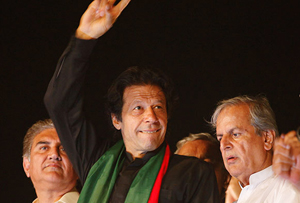Islamabad, Sep 9: Signs of a possible solution to the political crisis engulfing Pakistan emerged today with the embattled government saying it has reached an agreement with Imran Khan's party on most of their demands, except that of Premier Nawaz Sharif's ouster which it said is non-negotiable.
At the conclusion of the 12th round of talks between the government and Khan's Pakistan Tehreek-i-Insaf (PTI), Finance Minister Ishaq Dar said that an agreement has been reached on almost all points and they would come up with response on a couple of contentious issues after consulting the party leadership.
"One of their demands is non-negotiable for us," Dar, who is part of the government's negotiation team, said apparently referring to the main demand of Sharif's resignation.
The PTI team led by Shah Mehmood Qureshi said they have given their final list of demands and now it would be up to the government how they respond to end the 27-day crisis that has paralysed the country.
Sources said that PTI side had shown conditional flexibility on the resignation demand of the prime minister and wanted the constitution of Judicial Commission through an Ordinance with mandatory powers to conduct rigging investigation in the constituencies to be pointed out by the PTI, the Nation reported.
As the talks resumed, the protesters led by Khan and fiery cleric Tahirul Qadri shifted their sit-ins to D-Chowk from the Constitution Avenue.
Meanwhile, Khan asked the Supreme Court to take suo motu notice of the 800 containers placed around Islamabad to block off roads.
"CJP (Chief Justice of Pakistan), either order authorities to remove these containers, or we will remove it by force," said Khan.
Khan and Qadri have remained firm in their demand for Prime Minister Sharif's resignation.
Khan and Qadri have been protesting in front of Parliament since mid-August to force Sharif's resignation over alleged rigging in the 2013 general election won by Sharif's PML-N party.
Khan had said he will not go back without forcing Sharif to resign and asked his party leaders to bring more people to the sit-in.
Khan's call for extending the protest for two weeks has come at a time when he is already facing criticism for demonstrating even as the country has been hit by the worst floods in its history.





Comments
Add new comment